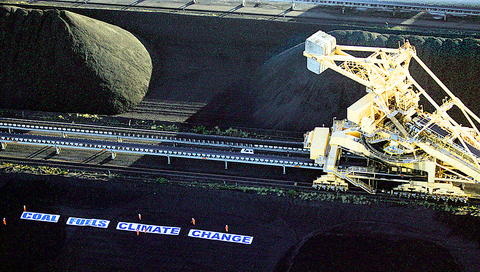Australia, the US, China, India and South Korea are getting together to develop technologies that would help curb greenhouse-gas emissions, officials in Canberra said yesterday.
The countries linked in an as-yet unannounced initiative that is called the Asia Pacific Partnership for Clean Development and Climate account for more than 40 percent of global greenhouse-gas emissions, Environment Minister Ian Campbell told reporters.
"By moving more and more towards renewable energy such as solar and wind and a whole range of technologies that we can develop here in Australia and ultimately export to places like China and India, building partnerships with these countries is going to be the solution," Campbell said.

PHOTO: AFP
Australia and the US are the only two rich countries that have refused to sign the Kyoto Protocol, an international agreement that sets binding targets for reducing the emissions of carbon monoxide and other gases that are blamed for global warming and climate change.
Australian Prime Minister John Howard agreed to join the US initiative when he met President George W. Bush in Washington last week. Howard also held a meeting with Indian Prime Minister Manmohan Singh, who was also visiting the US capital last week.
Australia -- on a per-capita basis the world's worst polluter -- won't sign the Kyoto Protocol because it wants to continue to rely on its large coal reserves for most of its electricity generation.
Canberra also has argued that poor countries like China and India that are big polluters as well should also participate in international efforts to slow climate change. Instead, they have won reprieves because their economies are still developing.
Campbell conceded that climate change is a reality but argued that Australians must not be asked to make any lifestyle sacrifices to keep it in check.
The price of petrol in Australia is one-third the price in Europe, and one in five new passenger vehicles registered in Australia is a fuel-guzzling four-wheel-drive with a government subsidy.
In addition, the Australian government has set no targets for shifting away from its reliance on coal for power generation.
The Labor Party's Anthony Albanese, the opposition environmental spokesmen in parliament, said the government would sign on to the Kyoto Protocol if it were serious about fighting climate change.
"A secret regional pact? It sounds like government spin," Albanese said.
The international environmental organization Greenpeace also denounced what would be a voluntary program, arguing that Canberra should embrace Kyoto along with other rich countries.
To make its point, Greenpeace used its ship to blockade Newcastle Harbor and pause activity at the world's biggest coal port.
The five-hour protest ended when police boarded the ship, arrested the captain, Derek Nicholls, and detained the crew.

PRECARIOUS RELATIONS: Commentators in Saudi Arabia accuse the UAE of growing too bold, backing forces at odds with Saudi interests in various conflicts A Saudi Arabian media campaign targeting the United Arab Emirates (UAE) has deepened the Gulf’s worst row in years, stoking fears of a damaging fall-out in the financial heart of the Middle East. Fiery accusations of rights abuses and betrayal have circulated for weeks in state-run and social media after a brief conflict in Yemen, where Saudi airstrikes quelled an offensive by UAE-backed separatists. The United Arab Emirates is “investing in chaos and supporting secessionists” from Libya to Yemen and the Horn of Africa, Saudi Arabia’s al-Ekhbariya TV charged in a report this week. Such invective has been unheard of

‘TERRORIST ATTACK’: The convoy of Brigadier General Hamdi Shukri resulted in the ‘martyrdom of five of our armed forces,’ the Presidential Leadership Council said A blast targeting the convoy of a Saudi Arabian-backed armed group killed five in Yemen’s southern city of Aden and injured the commander of the government-allied unit, officials said on Wednesday. “The treacherous terrorist attack targeting the convoy of Brigadier General Hamdi Shukri, commander of the Second Giants Brigade, resulted in the martyrdom of five of our armed forces heroes and the injury of three others,” Yemen’s Saudi Arabia-backed Presidential Leadership Council said in a statement published by Yemeni news agency Saba. A security source told reporters that a car bomb on the side of the road in the Ja’awla area in

US President Donald Trump on Saturday warned Canada that if it concludes a trade deal with China, he would impose a 100 percent tariff on all goods coming over the border. Relations between the US and its northern neighbor have been rocky since Trump returned to the White House a year ago, with spats over trade and Canadian Prime Minister Mark Carney decrying a “rupture” in the US-led global order. During a visit to Beijing earlier this month, Carney hailed a “new strategic partnership” with China that resulted in a “preliminary, but landmark trade agreement” to reduce tariffs — but

SCAM CLAMPDOWN: About 130 South Korean scam suspects have been sent home since October last year, and 60 more are still waiting for repatriation Dozens of South Koreans allegedly involved in online scams in Cambodia were yesterday returned to South Korea to face investigations in what was the largest group repatriation of Korean criminal suspects from abroad. The 73 South Korean suspects allegedly scammed fellow Koreans out of 48.6 billion won (US$33 million), South Korea said. Upon arrival in South Korea’s Incheon International Airport aboard a chartered plane, the suspects — 65 men and eight women — were sent to police stations. Local TV footage showed the suspects, in handcuffs and wearing masks, being escorted by police officers and boarding buses. They were among about 260 South